What is a shareholder?
A shareholder (also known as a stockholder) is someone who owns shares of a company. Shares represent a small piece of ownership in an organization—so if you open a brokerage account and buy shares of a company, you essentially own a portion of it. And when you own shares, you’re a bona fide shareholder.
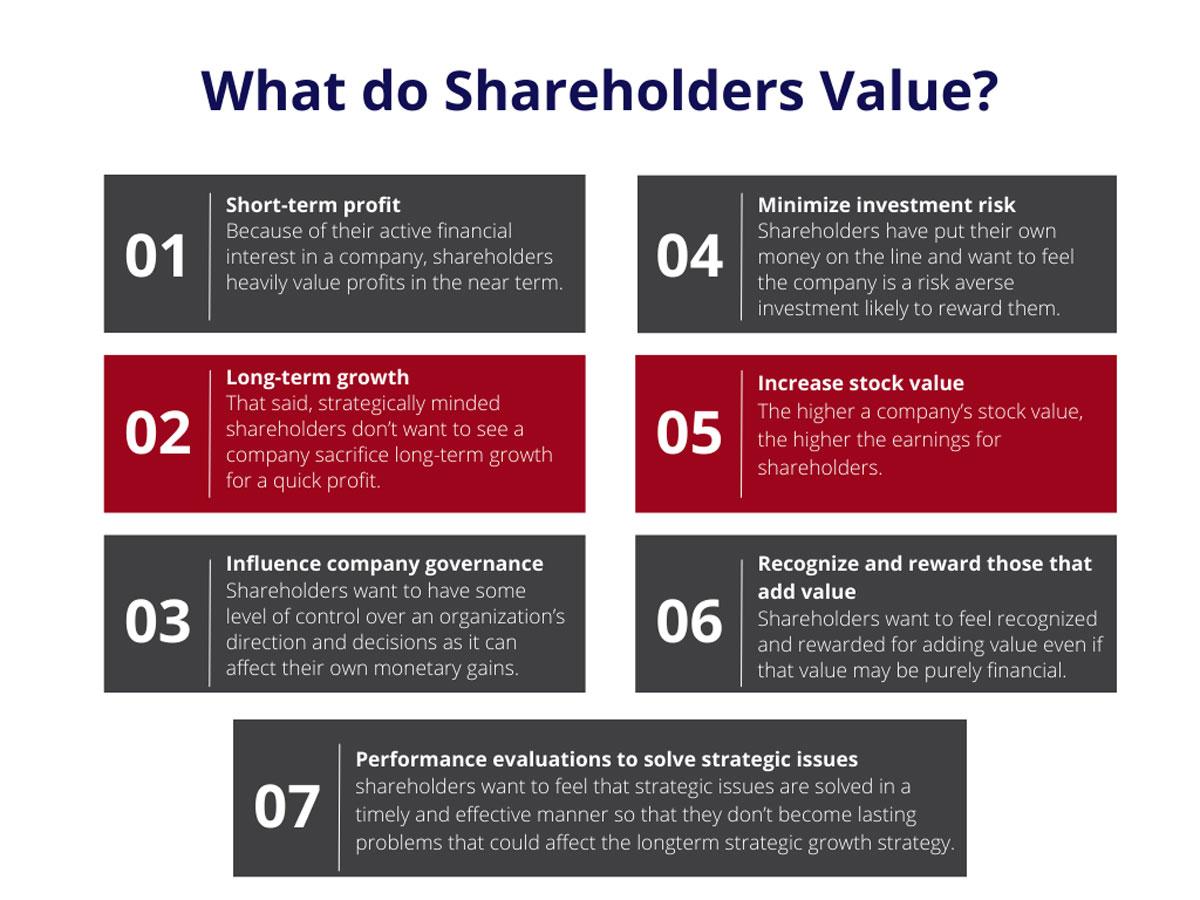
As a shareholder, you want to get the most financial return on your investment. That means you’re probably interested in how the company performs on a high level, because stock prices go up when the company does well. And when stock prices go up, you have an opportunity to sell your shares and make a profit.
Depending on the type of shares you own, being a shareholder lets you receive dividends, vote on company policies like mergers and acquisitions, and elect members of the company’s board of directors. Anyone who owns common stock in a company can vote, but the number of shares you own dictates how much power your vote carries. That means big investors hold the most sway over a company’s overall strategic plan.
Types of shareholders
Depending on the type of stock you own, you’re either a common shareholder or a preferred shareholder. You can buy both types of shares through a normal brokerage account, but they give you different benefits.
- Common shareholders own common stock. Common stock typically yields higher rates of return in the long-term and gives shareholders part ownership of a company. That means anyone who owns common stock in a company can vote on corporate policies and elect members of your board of directors. However, common shareholders shoulder a bit more risk—if a company is liquidated, they can only claim assets after bondholders, preferred shareholders, and other debtholders have been paid in full.
- Preferred shareholders own preferred stock. Preferred stock typically yields lower long-term gains but gives shareholders a guaranteed annual dividend payment. Preferred shareholders usually can’t vote on policies or elect board members, so they don’t have a say in a company’s future. However, they take on a bit less risk—if a company is liquidated, preferred shareholders can claim assets before common stakeholders.
What is a stakeholder?
A stakeholder is someone who can impact or be impacted by a project you’re working on. We usually talk about stakeholders in the context of project management, because you need to understand who’s involved in your project in order to effectively collaborate and get work done. But stakeholders can be more than just team members who work on a project together. For example, shareholders can be stakeholders of your project if the outcome will impact stock prices.
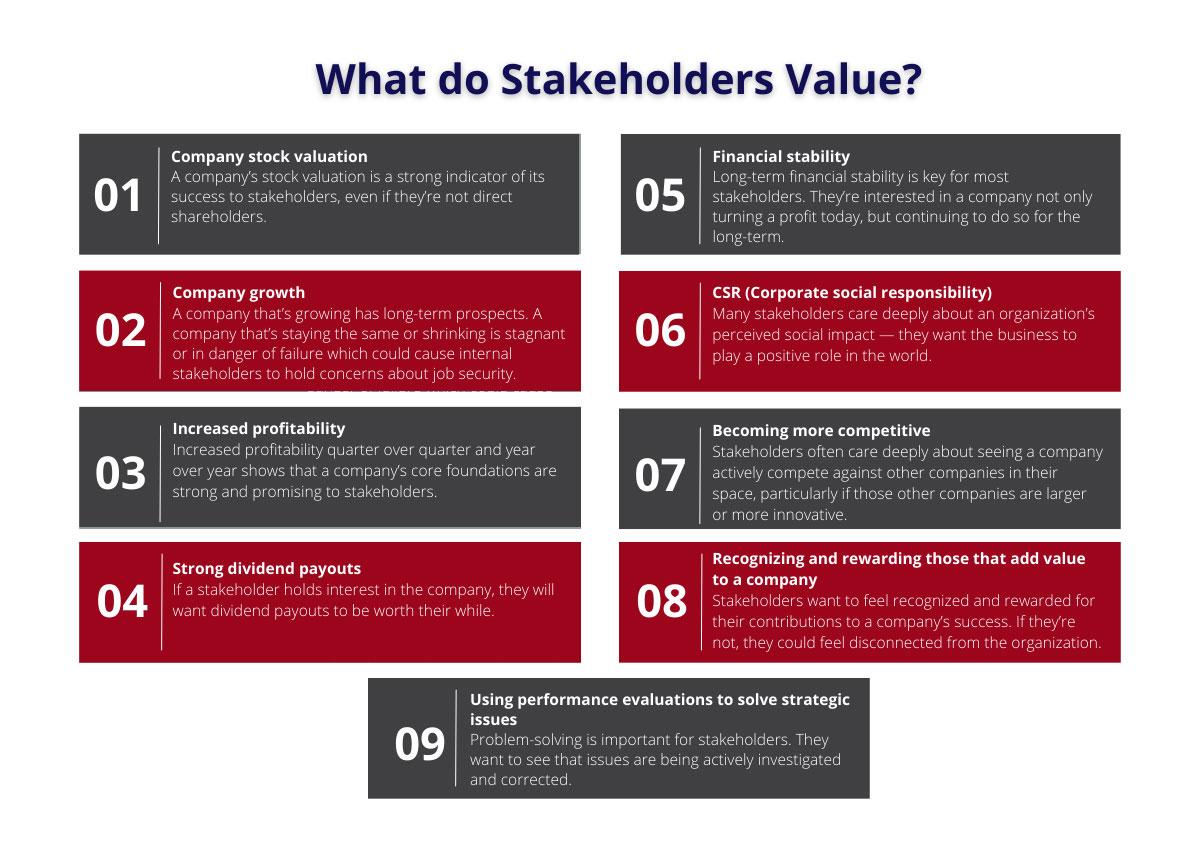
Stakeholders come in many different forms, from independent contributors to company executives. And they don’t have to be within your organization either—for example, an external agency you work with might be a stakeholder on an upcoming event. Similarly, your customers can be stakeholders when their preferences directly influence your product.
Types of stakeholders
There are two main types of stakeholders:
- Internal stakeholders are people who have a direct relationship with your company, like your teammates and cross-functional partners. They’re often employed by your company, but not always. For example, shareholders are internal stakeholders because they’re tied to your company through the stocks they own. As such, they’re directly impacted by projects that influence stock prices.
- External stakeholders are people who don’t have a direct relationship to your company, like customers, end users, and suppliers. Even though external stakeholders are outside your organization, your project still impacts them in some way. For example, ramping up a manufacturing project would require additional resources from suppliers.
Main differences between shareholders and stakeholders
The terms shareholder and stakeholder are often confused, but the difference between shareholders and stakeholders is significant. Beyond their definitions, these groups have key differences in priorities and timelines.
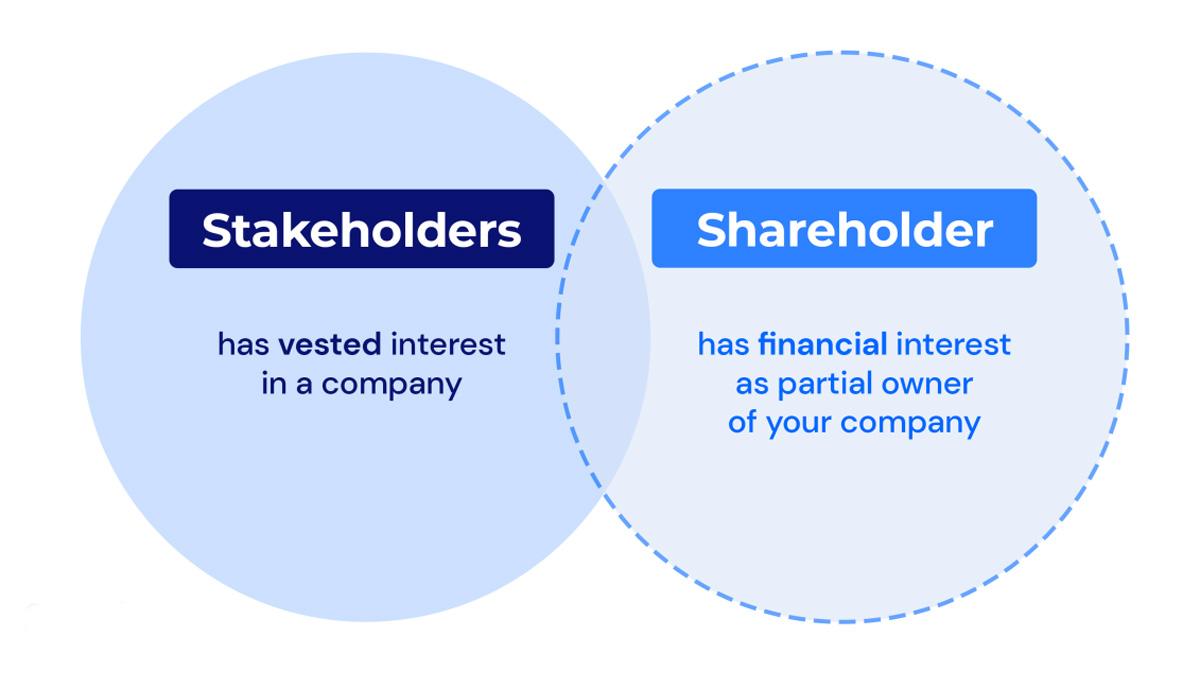
Different priorities
The difference between stakeholders and shareholders starts with what they care about most. Shareholders focus on their financial interests and expect profit from stock price increases or dividend payouts. Their top priority is maximizing shareholder value. Moreover, a shareholder with an ownership stake in a private company can also be responsible for that company’s debts, which gives them an extra financial incentive.
On the other hand, a stakeholder focuses on more than just the company’s stock or financial performance. Internal stakeholders (employees) want project success, career growth, and a positive work environment. External stakeholders (customers, suppliers, and business partners) seek great products, strong service, and mutually beneficial partnerships.
Different timelines
Another key difference between stakeholder and shareholder is their timeline for success. A shareholder is part owner of the company only while they own stock, so they often prioritize short-term goals that impact share price. If dissatisfied with the company’s profits, they can sell their shares and invest elsewhere.
Alternatively, a stakeholder is more interested in your company’s long-term success. They care less about short-term stock fluctuations and more about the company’s sustainability. For example:
- Employees want job security, career growth, and to be involved in company decisions.
- Customers seek consistent quality and service.
- Suppliers aim to maintain stable, long-term business relationships.
By understanding the stakeholder vs shareholder differences, businesses can balance financial interests with sustainable growth.
Who’s more important? Shareholders vs stakeholders
The difference between shareholder and stakeholder has sparked debate for years. Should a company’s management maximize financial returns for shareholders or take a broader approach that benefits all stakeholders? This question defines two major schools of thought.
Shareholder theory
Shareholder theory was first introduced in the 1960s by economist Milton Friedman. According to Friedman, a company should focus primarily on creating wealth for its shareholders. He argues that decisions about social responsibility (like how to treat employees and customers) rest on the shoulders of shareholders rather than company executives. Since company executives are essentially employees of the shareholders, they’re not obligated to any social responsibilities unless shareholders decide they should be.
Stakeholder theory
Stakeholder theory was first introduced in 1984 by a business professor named Dr. R. Edward Freeman. According to Freeman, companies should focus on creating wealth for all their stakeholders, not just shareholders. He argues that there are interconnected relationships between a business and its customers, suppliers, employees, investors, and the local community. For example:
- You want customers to be satisfied with your product and your company so they keep buying from you.
- You want employees to be happy and motivated at work so they can contribute their full energy and creativity.
- You want to help your financiers, partners, and shareholders make a profit so you can keep your investors and get more opportunities for growth.
Why you should prioritize stakeholder theory
When it comes to stakeholder vs shareholder priorities, what’s your approach? Sure, the interests of shareholders matter—they provide capital and have voting rights. But focusing solely on shareholder value can be risky because they typically chase short-term wins and stock price increases, even if it comes at the expense of the company’s success.
On the other hand, stakeholder theory helps you think bigger. When you prioritize the interests of all stakeholders, you build a healthier work ecosystem, improve employee well-being, and create stronger relationships that fuel real sustainability. And here’s the thing: when your team feels heard, they have a vested interest in company performance.
Only 15% of employees feel heard—but prioritizing stakeholders over short-term gains improves your decision-making process and invests in your company’s future.
Stakeholder management, simplified
Most people interact with stakeholders daily but rarely engage with company shareholders. This highlights a key difference between stakeholders and shareholders—stakeholders drive a company’s operations, while shareholders focus on financial returns. Because stakeholders impact success, managing relationships and keeping them informed is essential.
A project management tool simplifies this. Asana lets teams assign tasks, comment directly, organize projects, and send automated updates. This way, stakeholders get timely information—bridging the stakeholder vs shareholder gap.
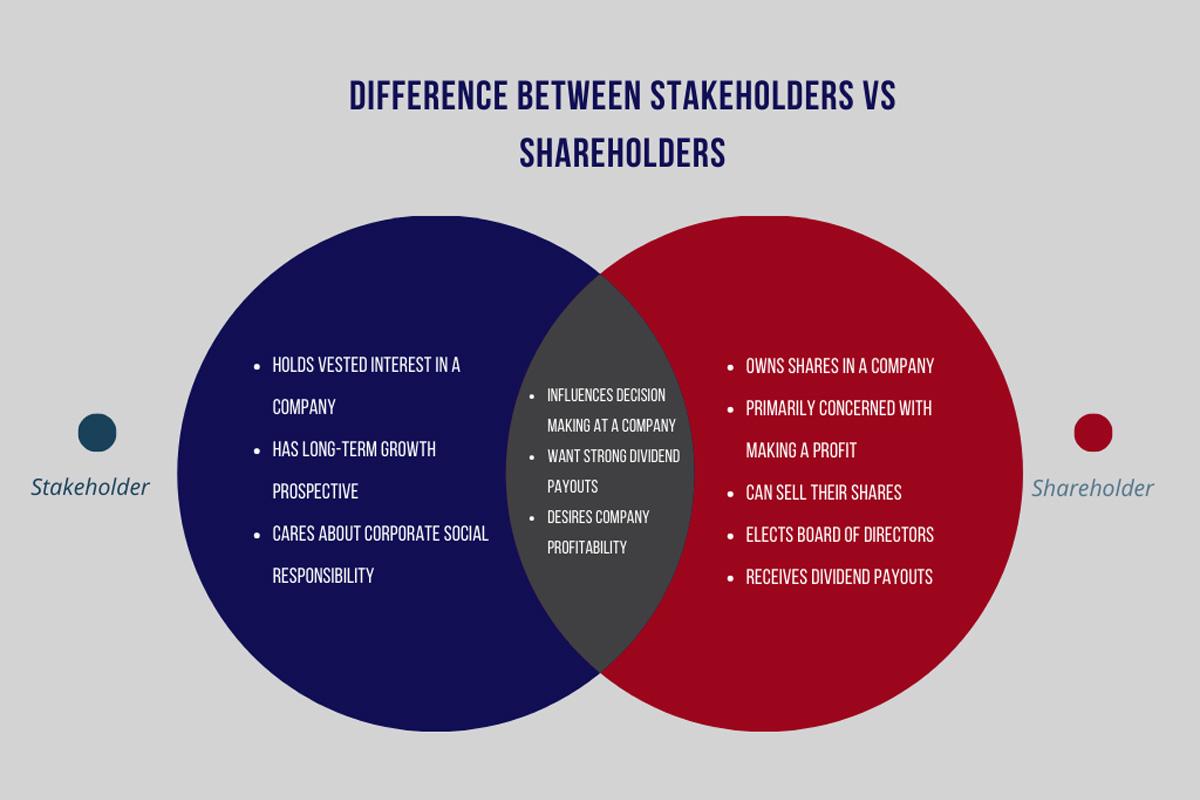

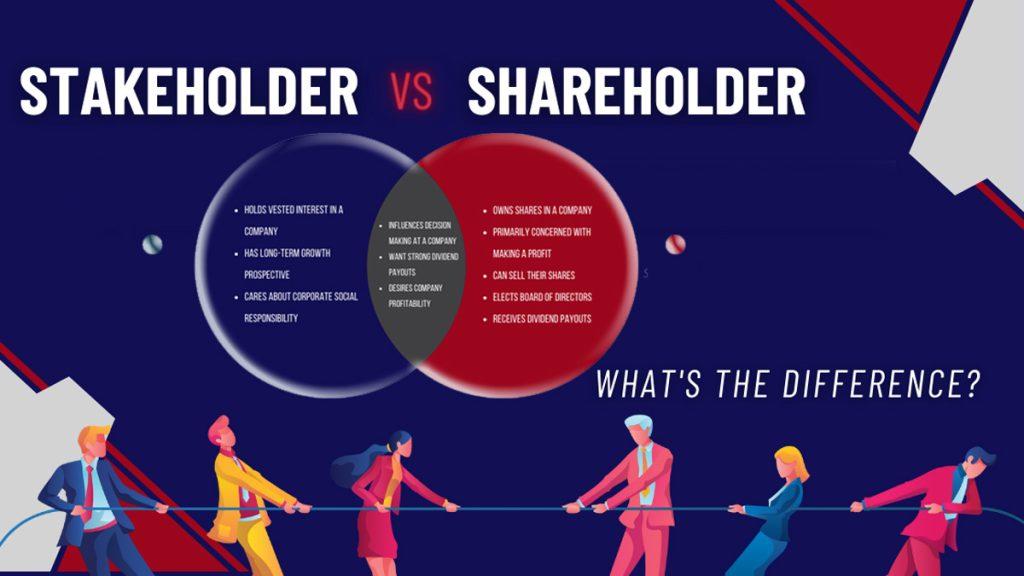



















Comments